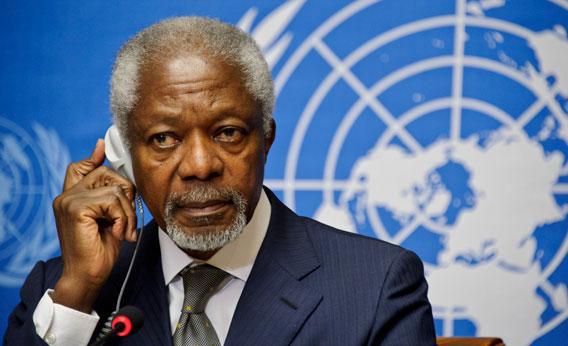Much has been said about the similarities between the chaos in Syria and the Balkan wars of the 1990s. But, while the prolonged killing may indeed be reminiscent, the political and diplomatic effort that finally ended the war in Bosnia is hardly in evidence today.
To date, there has been nothing similar to the Contact Group plan that was hammered out in the summer of 1994 by representatives from Britain, France, Germany, Russia, and the United States, and implemented the following year in Dayton, Ohio, after months of on-the-scene diplomacy. In Syria, the only diplomatic process is in the hands of the courageous, if beleaguered, former U.N. Secretary-General Kofi Annan, who has understood—better than many analysts of this latest international outrage—that any lasting political settlement must not be a triumph of one side or the other.
No one can watch the ongoing violence in Syria without a sense of horror at the armed attacks on largely unarmed civilians, overwhelmingly by groups that support Bashar Assad’s regime. But those who say that Syria is on the brink of civil war miss what has become more obvious with each passing day: Syria already is in a state of civil war, one whose battle lines were drawn months ago.
On one side is Assad’s minority Alawite tribe, which over the years has attracted secular Sunnis to share in the spoils of a one-party, authoritarian state. But Assad’s coalition is broader than that, which helps to explain how he has been able to hold on to power while other regimes in the region have not. Syria’s Christians, many of its 1.5 million Kurds, and even Damascus-based, secular classes have been disinclined to join what is widely perceived in the country—though not by the rest of the world—as a sectarian Sunni opposition that might not be supportive of cultural pluralism were it to assume power.
In the past, characterizing a conflict in a complex region as a civil war was a tacit warning that others should stay out. But the civil war in Syria has much broader ramifications, which could lead to a wider regional conflict. Given this looming threat, it is becoming increasingly clear that staying out of the Syrian mess may not be an acceptable choice for countries that have an interest in a calmer and more democratic Middle East.
Ominously, the conflict looks increasingly like a proxy war between Iran and the Sunni Arab states, which regard their own minority Shiite populations as a potential Iranian fifth column. Iran has sought to maintain its influence in the Levant (including in Lebanon and among some Palestinian groups) by providing material support to Assad. By contrast, many Sunni Arab states have provided varying degrees of support to the largely Sunni opposition, a hodgepodge of groups that include the Muslim Brotherhood and other sectarian forces similar to Egypt’s ultra-conservative Salafis.
Russia and China, bruised by their loss of face in the NATO-led intervention in Libya in 2011, have sought to keep the international community out of Syria. Both countries fear that intervention—whether militarily or through economic sanctions—could harm their interests in Syria, where they—especially the Russians—have been the dominant external players.
In the absence of concerted international action, the United States and Europe have largely weighed in with vocal condemnation of the party committing the overwhelming number of human-rights violations: Assad and his henchmen. They have also highlighted the loss of life in an effort to shame Russia into adopting a more amenable position.
But denouncing Assad or Russia is unlikely to produce any effect except to assure domestic audiences that the West is on the side of the angels in the conflict. Likewise, proclaimed support for disparate, barely known rebel groups; demands for dead-on-arrival sanctions resolutions; feckless calls for Assad’s departure (as if he plans to take the advice); and half-baked ideas about enforced “safe areas” (an utter failure in Bosnia) are unlikely to spare many lives, much less bring about the endgame that is so desperately needed.
What is really needed are serious and sustained negotiations among interested international powers (let’s call them a “contact group”) on a viable political outcome. A “Contact Group Plan” should be carefully worked out with Annan and his team (the only entity at this point that seems to have access to all sides). Most importantly, all of the plan’s stakeholders then need to support Annan, publicly and privately. Publicly declaring support for Annan’s cease-fire plan, and then whispering to journalists that it is “in tatters,” as has occurred repeatedly in recent weeks, will not get the job done.
Clearly, a new way forward is needed, and a good start would be a political/diplomatic plan that Annan could sell to the parties. In the Balkans, it was a U.S. team that finally sold the Contact Group Plan to the parties directly involved. We didn’t succeed because we were geniuses. We succeeded because we had tremendous support from every country that wanted to see the horrific conflict in Bosnia brought to an end. The same unqualified support is what Annan—the best diplomat we have out there—needs and deserves.
This article was originally published by Project Syndicate. For more from Project Syndicate, visit their new website, and follow them on Twitter or Facebook.
